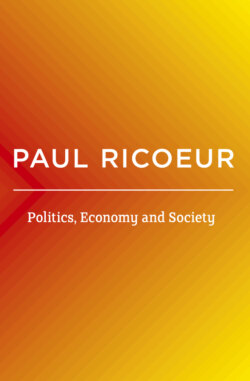Читать книгу Politics, Economy, and Society - Paul Ricoeur - Страница 9
1 The Adventures of the State and the Task of Christians The Twofold Biblical “Reading” of the State
ОглавлениеIt is of critical importance for a Christian interpretation of the State that the New Testament writers handed down to us not one but two readings of political reality: one, that of Saint Paul, leads to a difficult justification, the other, that of Saint John, to a tenacious distrust. For one, the State is the figure of the “magistrate,” for the other, it is the figure of the “Beast.”
We must begin by allowing these two figures to take shape within us, keeping both of them as possibilities, contemporaneous with one another, in every State we encounter.
Saint Paul, addressing Christians in the capital of the Empire – who were little inclined to recognize the authority of a pagan power, foreign to the Good News and, moreover, compromised in the trial that ended in the slow death of the Lord – calls upon his correspondents to obey not out of fear but as a matter of conscience: the State, wielding the sword, which punishes, is “instituted” by God for the “good” of the citizens. And yet this State has a very strange place in the economy of salvation, very strange and very precarious: the apostle has just celebrated the greatness of love – love, which creates reciprocal ties (“Love one another in brotherly love”) – love which forgives and repays good for evil. Now, the magistrate does not do that: the relation between the magistrate and the citizens is not reciprocal. He does not forgive, he repays evil for evil.
His province is not love but justice; the “good” he serves is, therefore, not the “salvation” of humankind, but the maintenance of “institutions.” One could say that through him a violent pedagogy is continued, a coercive education of human beings as members of historical communities, organized and governed by the State.
Saint Paul does not say (and perhaps does not know) how this pedagogy, penal in nature, is related to Christ’s charity: he only knows that this instituted order (taxis in Greek) realizes God’s intention concerning human history.
And at the same time he attests to the divine meaning of the institution of the State, Saint Paul reserves the possibility of an opposing reading. For, at the same time as this State is an “institution,” it is also “power.” Following the somewhat mythical conceptions of the era, Saint Paul pictures a more or less personalized demon hiding behind each political entity; now, these powers have already been vanquished on the Cross – at the same time as the Law, Sin, Death, and other powers – but are not yet annihilated. This ambiguous status (“already” but “not yet”), on which Oscar Cullmann1 has decisively commented, does much to illuminate the theological significance of the State: intended by God as an institution, half-way between condemnation and destruction as power, altogether out of kilter with the economy of salvation, and in reprieve until the end of the world.
It is therefore not surprising that in another historical context, where the evil of persecution overwhelms the good of order and the law, it is the figure of the “Beast” which serves to denote the evil power. Chapter XIII of the Apocalypse depicts, moreover, a Beast, wounded, doubtless mortally, but whose wound is healed for a time; the power of the Beast is not so much the power of irresistible force as of seduction. The Beast produces marvels and demands the adoration of the people; it subjugates through lies and illusions (a description, as we see, close to that of the “tyrant” in Plato, who reigns only thanks to the “sophist,” who first twists language and corrupts belief).
This twofold theological grid is full of meaning for us: hereafter we know that it is not possible to situate ourselves in an anarchism motivated by religion, under the pretext that the State does not declare its belief in Jesus Christ, but nor can we take refuge in an apology for the State in the name of “submitting ourselves to the authorities.” The State is this two-sided reality, at once instituted and fallen.
